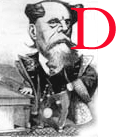 avies, who follows Partlow and Jordan in describing the narrator of Great Expectations as a small businessman with a small businessman's habits of mind, points to several key scenes in which these attitudes become important, even predominant. First, he points to the scene in Chapter 34, when Pip and Herbert try to get their financial affairs in order: “I established with myself on these occasions, the reputation of a first-rate man of business — prompt, decisive, energetic, clear, cool-headed. When I had got all my responsibilities down upon my list, I compared each with the bill, and ticked it off. My self-approval when I ticked an entry was quite a luxurious sensation.
avies, who follows Partlow and Jordan in describing the narrator of Great Expectations as a small businessman with a small businessman's habits of mind, points to several key scenes in which these attitudes become important, even predominant. First, he points to the scene in Chapter 34, when Pip and Herbert try to get their financial affairs in order: “I established with myself on these occasions, the reputation of a first-rate man of business — prompt, decisive, energetic, clear, cool-headed. When I had got all my responsibilities down upon my list, I compared each with the bill, and ticked it off. My self-approval when I ticked an entry was quite a luxurious sensation.
Davies, who does emphasize the comic aspects of these narration, argues
Given Pip's belief that he is a gentleman, his pride in his own business acumen and clerical expertise is oddly misplaced. Bentley Drummle, for instance, a “real" gentleman because of birth, would simply despise such qualities. . . . On Pip's part we see memory in action, a lingering near-ahvistic recollection of business virtues — orderly affairs, meticulously kept books, financial prudence — insistent during his childhood. In Victorian terms Pip will never be a “real" gentleman, not only because he is far too conscious of money and cares what people think of him, but because he has always belonged to the world of small-businessmen. [96]
Davies similarly argues that suggest an essentially commercial, middle-class set of attitudes and assumptions, quite uncharacteristic of a Victorian gentleman, inform the chpater in which Pip hides Magwitch, for Dickens's protagonist
reflects that “a ghost could not have been taken and hanged on my account, and the consideration that he could be, and the dread that he would be, were no small addition to my horrors" (xl, 353). Not only are actions fraught with human emotions represented, first and foremost, as “business transacted," but the basis of Pip's vocabulary — “proprietorship," “secure," “take possession," “account," “consideration," “addition," and so forth — even when the text forces it to express other meanings, is drawn from the commercial world and never wholly free from commercial connotations. [98]
One last example — Pip's first visit to Miss Havisham (Chapter 8): This episode, according to Davies,
is full of the lingering echoes of Victorian business-letters, as Pip, indeed, files his report of his past life: “I entertained this speculation . . . I calculated . . . I took note . . . I regret to state. . .". Even when he fights the young Herbert in Satis House garden and the latter butts him, he comments on Herbert's head: “I had a right to consider it irrelevant when so obtruded on my attention" (xi, 119). Suddenly we are far from boys fighting and in a world of high desks, scratching pens and formal communications.
Some Questions
What are the effects of recognizing this commercial vocabulary, which becomes an important motif in the novel?
Can you find additional instances of it?
How does Davies's argument affect your understanding of the ending of Great Expectations?
Finally, is such vocabulary characteristic of Dickens and Pip or just of Pip? In other words, does the novelist consciously employ such vocabulary to characterize Pip, or is its appearance just something so much part of his own worldview that it just happens to enter the novel? What evidence would convince you of either of these views?
References
Davies, James A. The Textual Life of Dickens's Characters. Savage, Maryland: Barnes and Noble, 1990.
Jordan, John O. “The Medium of Great Expectations." Dickens Studies nAnnual 2 (1983): 78.
Partlow, Jr., R. B. “The Moving I: A Study of the Point of View in Great Expectations: Hard Times, Great Expectations, and Our Mutual Friend: A Casebook.," ed. Norman Page. London: Macmillan, 1979.
Last modified December 2003